Metrics Reporting: How to Use it to Level Up Your Marketing

In this guide, you’ll learn the ins and outs of metrics reporting, the fluff-free data points to prioritize on, and how to create a metrics report or scorecard without sacrificing hours of your time.
Let's begin.
What is Metrics Reporting and Why You Should Do it?
Metrics reporting tracks crucial performance data points that help you understand how close or far you are from hitting your strategic goals and meeting team members’ targets. Using effective data collection methods, you’ll ensure that all aspects of your ad campaigns are aligned with overall objectives.
That way, you can:
Analyze promotional strategies confidently: Daily reporting helps marketing teams analyze what’s working in real time, implement improvements, and make the most of their budget.
Save time and money by a long shot: Time is money. The longer you push off reporting metrics, the more insights you’ll miss. Invest in a metrics reporting tool like DashThis to automate your workflow and gather more actionable insights in less time.
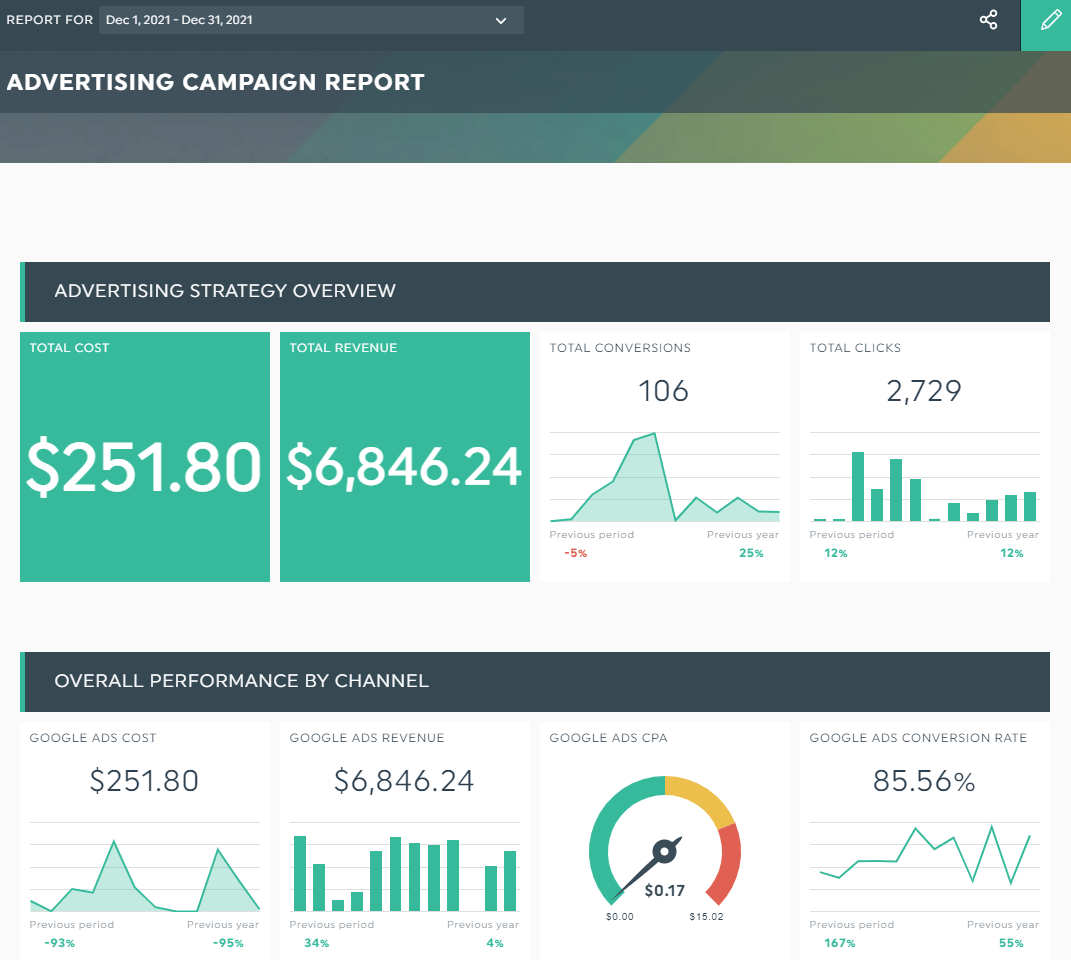
Grab this dashboard with your own data!
This cocktail visualization of different metrics gives you a snapshot of what’s happening in a single glance. Use it to back up your strategy when presenting to stakeholders in informed decision-making meetings.
Improve overall marketing campaigns and delight even the most challenging clients: The time you gain back from automated metrics reporting frees up more time to brainstorm better ideas for your campaigns.
Start your 15-day free trial with DashThis to reap the benefits of metrics reporting today.
How to Choose the Right Metrics?
Metrics set you on the right track.
Pick the wrong ones, and you’ll end up creating a marketing report full of fluff.
Every client has different goals for what they need to track, but here are the general “Big Four” key metrics you’ll want to master.
But first, a quick note on metrics definitions: Metrics are different from KPIs. While key performance indicators (KPIs) tie directly to business goals, metrics link to the processes and activities related to said business goals.
Metrics provide more context around the KPIs and tell you how close or far off you are in hitting your target. All KPIs are essentially metrics, but not all metrics are KPIs. In other words, a single KPI can have multiple metrics. For a detailed comparison, check out our guide on the difference between metrics and KPIs.
Metrics for Social Media
Social media is a lot more than Gen Zs chasing clout.
When used correctly, it's a megaphone for raising awareness and engaging with an untapped audience.
Include three popular social media performance reporting metrics in your list:
- Reach, impressions: Both metrics are vital, especially when measuring the success of advertising campaigns (e.g., if you’re running a 3-day promo, aim for a high impressions per user count).
- Engagement rate: The more often a follower interacts with your content, the more likely they’ll convert to a customer. Many social media marketers believe a good engagement rate hovers around 1% to 5%.
- Click-through rate (CTR): CTR is a micro-conversion where users complete an action (i.e., click) towards the conversion path. A high CTR and low conversion rate could signal a disconnected experience in your content.
- Cost-per-click (CPC): This paid advertising metric is calculated by dividing advertising cost by number of clicks. Aim for a low CPC to allow more clicks for your marketing budget.
Metrics for SEO
SEO is often underutilized and misunderstood.
Just think about the number of times clients demand to prioritize vanity SEO KPIs without contextual reasons (looking at you, page views)... when they should focus on these sales-focused data points in their SEO analytics tools:
Organic traffic: A steady stream of healthy free traffic is a dream of many. Couple that with a high conversion rate, and you’ve got yourself a powerful lead generation machine. Dig into these data points for a clearer picture of your website traffic in DashThis’ SEO dashboard:
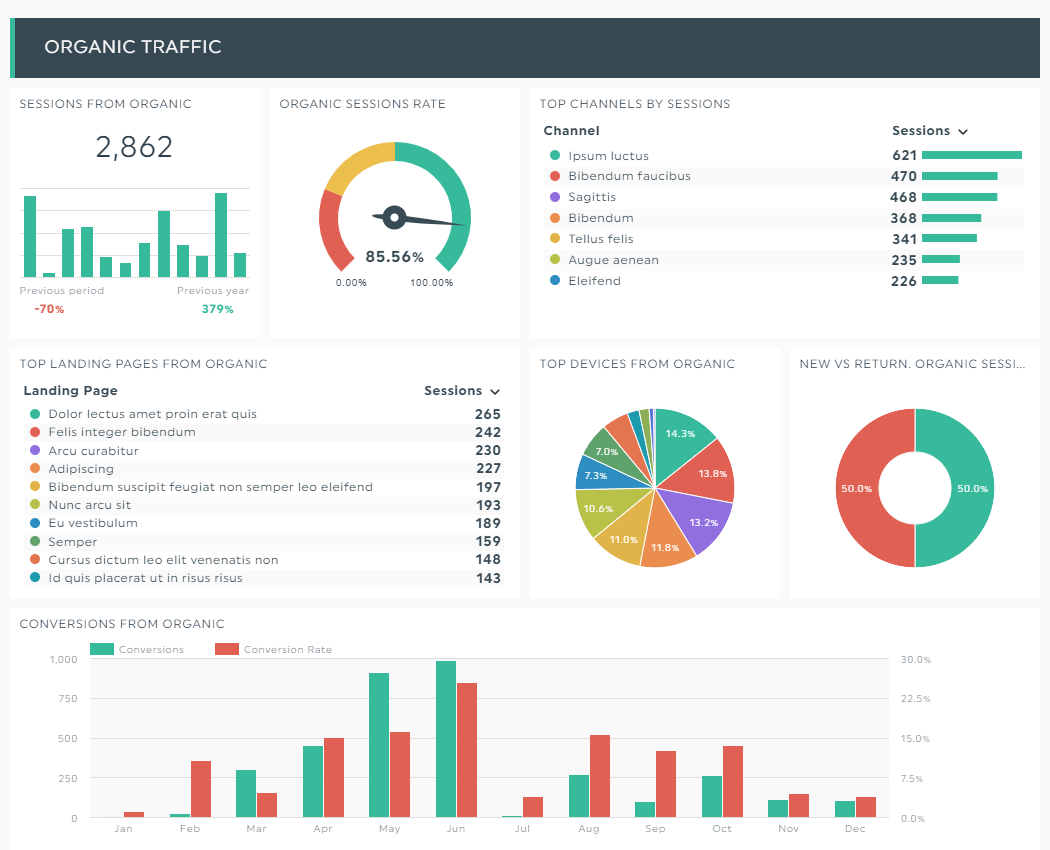
Grab this SEO dashboard with your own data!
- Bounce rate: High bounce rate usually indicates a poorly designed website, boring content, or poor targeting. According to CXL, while bounce rate doesn’t directly impact a site’s rankings, it does improve SEO performance. Note to self: Improve usability and targeting.
- Backlinks: Backlinks operate as trust tokens. The more inbound links you gain from reputable and relevant sites, the higher you rank on the SERPs.
Metrics for Google Analytics
Google Analytics (GA) is an indispensable tool in every marketer’s stack—and free, to boot.
Here are three popular metrics we recommend to understand how visitors interact with your website and build a better user experience.
- Session duration: This refers to the time users spend on your website. To encourage web visitors to stay longer, consider researching the customer journey and creating engaging content.
Navigating GA is an intimidating experience—even for seasoned users.
There’s just so much data!
Here’s a dashboard that turns Google Analytics KPIs into eye-catching graphics.
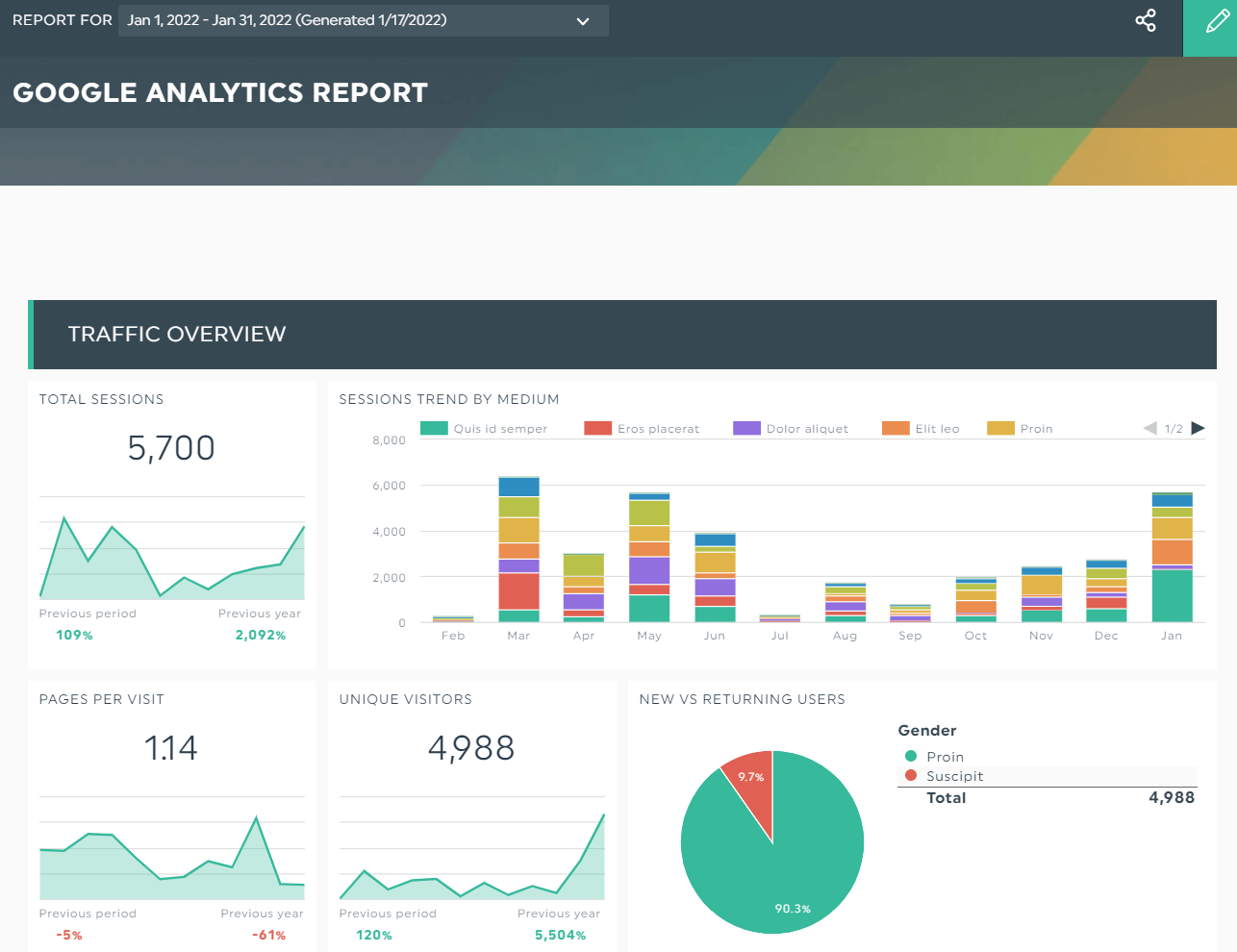
Grab this Google Analytics dashboard with your own data!
- Top channels: GA’s top channels help you identify the most effective marketing channels (Bonus Tip: While you’re at it, check Top Conversion Paths to pinpoint the most popular path visitors took to convert).
- Top pages: Best-performing pages help you spot patterns you can repeat and replicate for tremendous SEO optimization.
Metrics for Sales
Sales metrics are unskippable, as they show how far along you are at hitting your end goals.
Note how the ecommerce dashboard below gives you an overview of the total store sales. The conversion rates, though erratic, have significantly improved compared to the previous year.
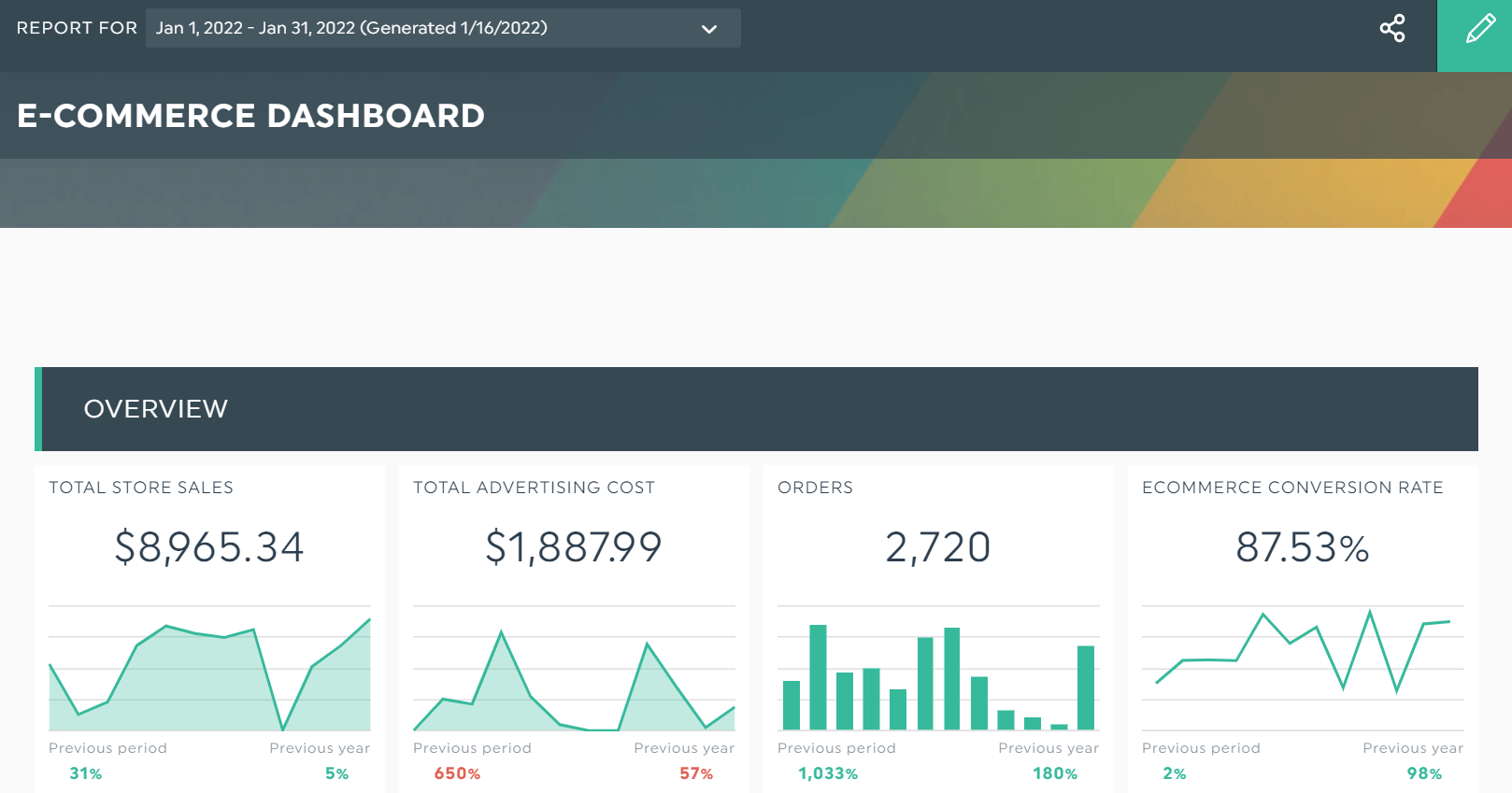
Grab this dashboard with your own data!
Here are three metrics for sales you need to track today:
- Number of leads: Just how much of your website traffic translates into quality leads? This sales- data driven metric has all the answers.
- Cost per lead (CPL): Find out if you’re overspending on acquiring leads. For example, if your CPL is more than your marketing budget, that means you’re losing some serious cash. To lower it, consider targeting prospective buyers further in the funnel or running re-targeted ads.
- Average order value (AOV): This is a popular ecommerce metric. There are myriad ways to increase AOV, including creating an order minimum for free shipping, cross-selling and upselling relevant products, and offering a loyalty program for your hardcore fans.
How to Implement Metrics Reporting?
In this section, learn how to create a dashboard for your metrics reporting with a few quick clicks.
- Pick your desired report from 40+ metrics reporting templates (or start from scratch)
- Connect your favorite apps or data sources
- Select your metrics and KPIs from Preset Widgets
- Drag and drop them as you see fit
- Click Color Themes, add a logo, etc. to personalize
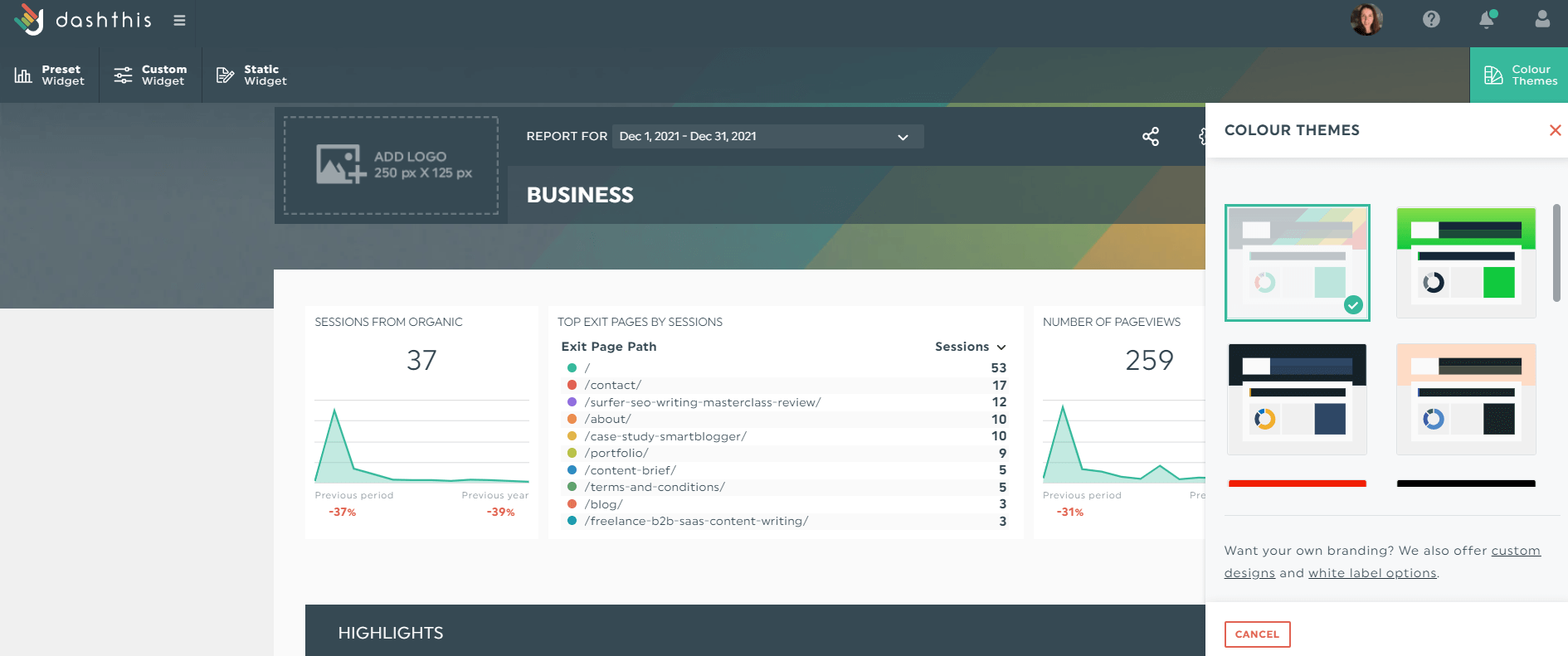
Expert’s Tip: Stuck on what KPIs to focus on? DashThis sets up its widgets based on the most commonly used KPIs, so you can rest assured that you’re focusing on the most high-level data points.
Let’s say you’re creating a business dashboard to show clients how their multiple marketing channels are performing, but you’re not 100% sure which business metrics to focus on.
Click Preset Widgets > Multi-Channel Funnels, and DashThis will recommend the most popular business KPIs in no particular order.
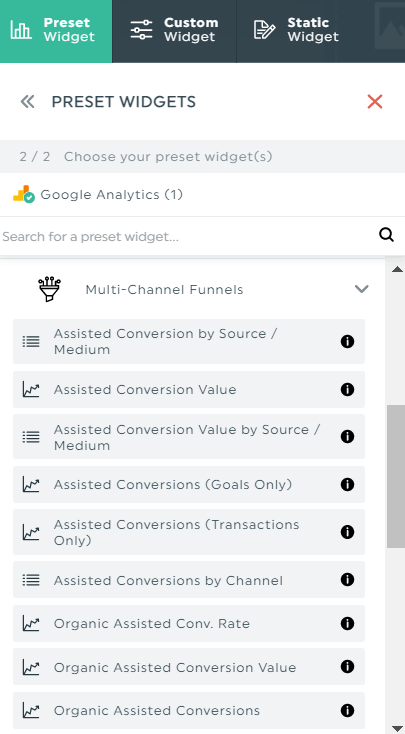
Click Sharing Options > Share by Email to send the report to stakeholders when you’re ready. You can even set the frequency to automate your metrics reporting for greater convenience.
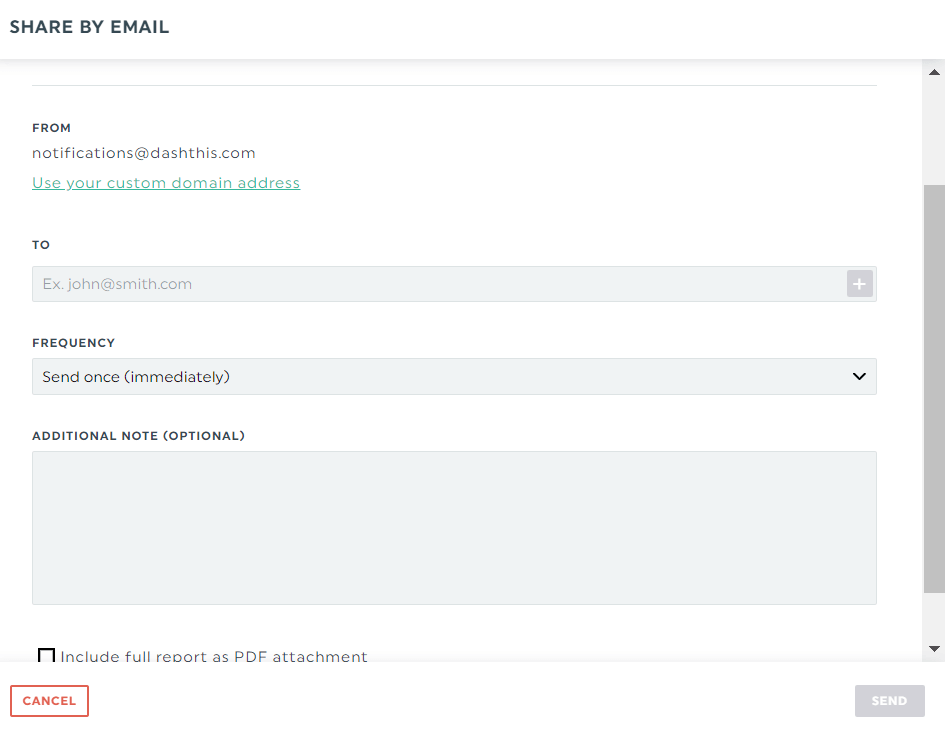
Don’t forget to save it as a custom report so that you can use it repeatedly across other clients of similar goals.
Start Metrics Reporting on DashThis Today
Now that you’re 100% convinced of the life-changing magic of metrics reporting, start your 15-day free trial with DashThis today.
There's no question metrics reporting is a prerequisite for marketers looking to improve their marketing campaigns, analyze results with confidence, and save time and money in the long term.
DashThis even has preset widgets for multi-channel funnels that recommend the most effective metrics for specific goals, ensuring you’re aligned with your overall strategic goals.
Metrics reporting helps you assess your initiatives, optimize your ad campaigns, and improve marketing strategies. DashThis provides all the tools you need, with seamless integrations to support data collection from various sources.
Dashthis has everything you need! Grab your 15-day trial today to unlock 10 dashboards for free.
Automate your metrics reporting with Dashthis
Read More
Don’t miss out!
Automate your reports!
Bring all your marketing data into one automated report.
Try dashthis for free

